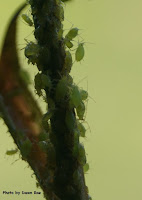Insects In Your Container Garden
 I have a young rose bush that I took up to my acreage to plant. Unfortunately, I ran into some obstacles and was not able to plant it there. I brought it back to the apartment with me and planned to let it live happily on my sunny balcony until I could take it up and plant it.
I have a young rose bush that I took up to my acreage to plant. Unfortunately, I ran into some obstacles and was not able to plant it there. I brought it back to the apartment with me and planned to let it live happily on my sunny balcony until I could take it up and plant it.Today, I noticed that it was looking a little ragged and sickly. At first I thought it was from all of the traveling we did last weekend. I touched a leaf and realized it was very sticky. Upon closer examination, the plant appeared to be covered in BUGS! I stifled a scream and ran inside to research what kind of bugs they were; friend or foe. And what to do about it.
Aphids!
I discovered I had a large family of Aphids on my rose plant.
"Aphids are small, soft-bodied insects with long slender mouthparts that they use to pierce stems, leaves, and other tender plant parts and suck out fluids."
"Low to moderate numbers of leaf-feeding aphids aren't usually damaging in gardens or on trees. However, large populations can turn leaves yellow and stunt shoots; aphids can also produce large quantities of a sticky exudate known as honeydew, which often turns black with the growth of a sooty mold fungus. Some aphid species inject a toxin into plants, which causes leaves to curl and further distorts growth"-- both quotes from Aphids Management Guide by UC IPM
So I found my answer. These little bugs, exuding sticky nastiness all over my rose bush were definitely foe. And had to go. But how to get rid of Aphids feasting on a plant, in a container, on a balcony, was the next question.
Ways to Control Aphids
A partial list of aphid pest control approaches:
- Chemical Pesticides
- Organic Neem Spray
- Soap & Water Spray
- Essential Oils Spray
- Release Lady Bugs
- Bug eating birds
- Literally Pick the bugs from the plants
- Spray the bugs from the plants with the garden hose
In addition to those items, I read about sprinkling flour on the plant/bugs, using a garlic/onion concoction that required a food processor, and other home remedies.
I am not generally against pesticides. But I do prefer to go natural when I can. There was No-Way-In-Heck I was going to pick those nasty little things from my plant with my fingers! While the birds and the lady bug solutions would be my choices on the acreage, I don't imagine my neighbors would like a flock of guineas on my balcony. Nor would the lady bugs like to be confined to my balcony - even if I could.
So I made a soap spray.
After doing more research, and halving other recipes, I mixed a cup of water and slightly less than a teaspoon of dish soap. I sprayed the plant liberally. And waited. The soapy water appeared to be effective as many of the bugs keeled over - feet in the air. Other bugs tried to skeedaddle but didn't get farther than the edge of the pot.
I then took the rose bush and container into the tub. Tilting it at an angle, I gave it a gentle shower to rinse the bugs and soapy water from the plant.
Only time will tell if the soapy water damaged my plant. Or if the aphid infestation caused the leaves to curl up enough to create permanent damage to my pretty new rose bush. But so far, the soapy water followed by the shower seems to have been effective.


You did the right things, congratulations and I'm sure your rose will reward you for your courage by blooming on your balcony.
ReplyDeleteI sure hope so. That poor rose, the leaves are already curled up and sad-looking.
DeleteGood luck with defeating the aphids and saving the rosebush, Dawn. Would the soap & water solution work on tomato plants? I've had aphids on them before.
ReplyDeleteI'm far from expert. I kill plants more successfully than I raise them. But.... I did see videos and articles about the soapy water being successful for both roses and veggies. So other gardeners do use the soap method for their tomatoes.
DeleteThis comment has been removed by the author.
DeleteI have been using dish soap and water on my rose bushes for decades. It seems to work quite well and I don't have to worry about pesticides in my backyard. I have never washed it off, but then again, the rain would do that. Aphids are an endless problem unfortunately regardless of the location of the rose bush.
ReplyDeleteIt's a comfort to know someone who has been using the soapy water method with success.
DeleteOh! I also meant to comment about the photos! Great shots of those nasty little buggers!!!
ReplyDeleteThanks! It wasn't easy to get shots of them that weren't blurry. But I really wanted to see them a little more close-up.
DeleteThanks for sharing this article !!
ReplyDeleteI really get frustrated by these insects. They damages my garden plants and I do nothing for that. But after reading this article I know how to get rid out of these mealybugs and thrips
BEAUVERIA BASSIANA
Natural aphid spray
ReplyDeletePyrate Natural Insecticide uses the power of nature in a 40g/L Pyrethrin synthesised with 160g/L Piperonyl Butoxide. The active ingredient, Pyrethrin, is sustainably harvested from Australian grown chrysanthemum flowers.